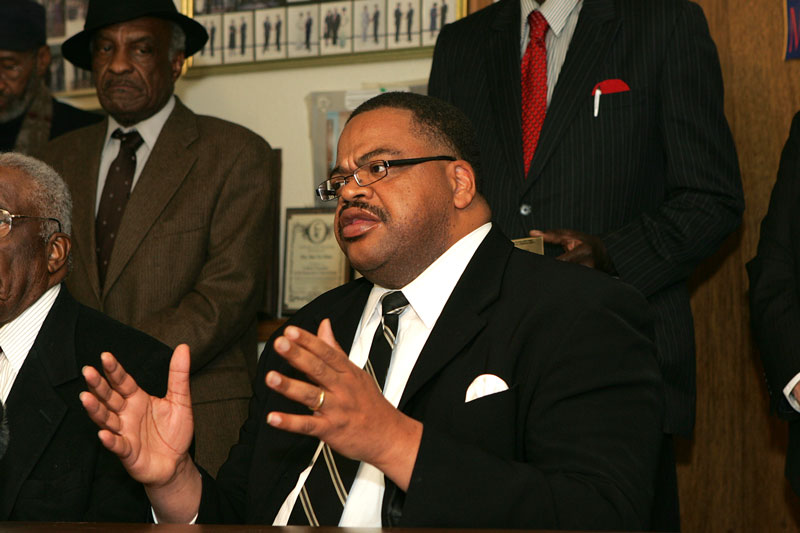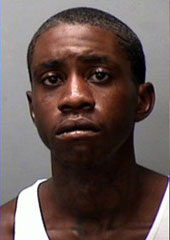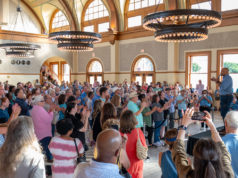It’s hard to feel much sympathy for Bruce Terrell Rogers. The young Crowley man tried to poison his parents in 2005, served five years in jail for that, got out in March 2009, and hasn’t done much with his life since then. By his own admission, he watched television, played computer games, and spent time on Facebook.

In the last few weeks, the 24-year-old ended up sitting in an isolation cell on suicide watch in a jail in downtown Fort Worth. The Rev. Kyev Tatum, local community activist and president of the Fort Worth chapter of the Southern Christian Leadership Conference, believes the Fort Worth police department is responsible for that. Just about everyone else seems to think Rogers is responsible for his own problems.
Rogers’ current situation started with the senseless shooting of Eric Forrester, a 17-year-old senior at Southwest High School, on April 12. Forrester and his sister had gone home for lunch that day and discovered two thieves robbing their house. The sister fled; Forrester was shot in the head and died two days later at John Peter Smith hospital. The murder of a bright, well-loved, athletic young man understandably drew heavy news coverage.
The day after the killing, police got a tip from a friend of Rogers’, who told them that he’d been asked to participate in the burglary of the Forrester home. Forrester’s sister, who saw two men running from the scene, picked Rogers out of a photo lineup, saying she was “65 percent sure” that he was one of the men. Police arrested Rogers the next day and charged him with murder.
Subsequent news stories revealed the details of Rogers’ earlier crimes and alleged crimes. He had put insecticide into a drink he made for his parents — which was drunk instead by his younger brother and a nephew, who sustained injuries but survived. He had also been arrested several times since his release from prison, on suspicion of theft and petty larceny, though he was not convicted in any of those cases. And at least one story reported the allegation that Rogers had pawned three computers stolen from the Forrester home.
Rogers apparently did not immediately ask for a lawyer. As a result, he was interrogated for a full week before a lawyer was appointed for him. During that time, he insisted he’d had nothing to do with the killing. He said later that he had thought he was being arrested for a robbery he had committed near his home weeks earlier. He agreed to a polygraph test and passed it.
 Tatum interviewed Rogers at the Mansfield jail and came away so sure of his innocence that he organized a demonstration outside the facility demanding an investigation into why Rogers had even been arrested for the murder.
Tatum interviewed Rogers at the Mansfield jail and came away so sure of his innocence that he organized a demonstration outside the facility demanding an investigation into why Rogers had even been arrested for the murder.
“You don’t charge someone with capital murder — which carries the death sentence — based on he-said/she-said from an acquaintance and from someone who is 65 percent sure he was one of the men she saw. You ought to have real evidence,” Tatum said. “They had no [stolen] computers, no real witnesses, no fingerprints in the Forrester home. The police had nothing but still charged a man with a capital crime. They rushed to judgment.”
In fact, police fairly quickly concluded that, indeed, Rogers had had nothing to do with the Forrester killing. He’d been at home, on Facebook, when it happened. He’d never met Forrester, never had contact with the stolen computers. By Friday, April 16, the charges against him had been dropped. The next day, two 16-year-old boys, who had no connection with Rogers, were picked up and charged with the crime.
But Rogers wasn’t off the hook. Several weeks earlier, after shopping at a Wal-Mart near his apartment, he’d gotten a ride home from a stranger. Just before he got out, Rogers turned on the man, demanding money. The man handed over $50, and Rogers also took the car keys and cell phone to keep the man from following him or calling police.
Rogers, who has admitted to the robbery, said he threw the keys away almost immediately and tossed the phone into a storm sewer after using it once — but that was enough to lead police back to him.
The victim reported the crime to Crowley police, who found the phone, hit redial, and learned from the person who answered that Rogers had made the last call on that phone. The man picked Rogers’ photo out of a lineup, and police issued a warrant for Rogers’ arrest.
They were still looking for Rogers when his name surfaced in the Forrester case, due to the anonymous caller. After that, Crowley police arrested him.
Once police realized that Rogers had not taken part in the killing, they exchanged the murder charge for a charge of aggravated robbery, a felony that carries a sentence of up to 99 years on conviction.
He was subsequently moved to an isolation cell and put on suicide watch on the recommendation of mental health staffers. Shortly thereafter he was moved from the Mansfield jail to one of Fort Worth’s two downtown jails and again put in isolation.
To Tatum, the aggravated robbery charge seems excessive.
“I am not going to condone the robbery in any way or fashion,” said Tatum. “But I am going to question the decision to charge him with aggravated robbery for $50 when no weapon or force was used. That’s more like petty larceny. And I am going to question why he did not have a lawyer appointed for him during his interrogation on a capital murder charge and why he was put in isolation.”
Sheriff’s department spokesman Terry Grisham said that Rogers was put in isolation for his own protection. “He was linked to a very high-profile case, and for his own protection he would be put in a one-man cell,” he said. Grisham called back late Tuesday to say that Rogers’ “attitude has greatly improved” and that he had been moved out of isolation and was receiving visitors.
The affidavit supporting the burglary charge alleges that Rogers did have a weapon — a knife — and that he did threaten the 57-year-old victim with it.
A lawyer was not appointed for Rogers until five days after the capital murder charges were dropped. The attorney, prominent Fort Worth lawyer Jack Strickland, did get in contact with Rogers but, as of Monday, had not met him.
Strickland said it is not unusual for suspects to be questioned without a lawyer present, even in capital murder cases. “That’s normal,” he said. “They can also take DNA, fingerprints, take a handwriting exemplar, put the suspect in a lineup. Those things are all considered non-crucial to the case, though a lot of suspects feel differently.”
Tatum is still upset. “They can make it out any way they want,” he said, but “the truth is that they held him, questioned him, gave him a polygraph — which he passed — all without having an attorney appointed for him, much less having an attorney present. …”
“We have a lot of innocent people in jail because of those tactics,” he said. “And this is a clear case where a rush to judgment, based on insufficient evidence, might have gotten a man a lethal injection.”
“An investigation is a fluid thing,” said Sgt. Chad Mahaffey, a Fort Worth police spokesman. “The Fort Worth police department had enough to arrest Mr. Rogers on the murder — and if it was your family, you would have wanted that arrest made. Subsequent facts came to light, which indicated that he was not the perpetrator of the crime, and so those charges were dropped.”











